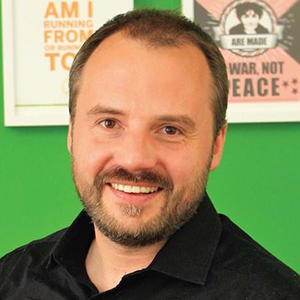

How Brands Must Defend a Free Press in the Digital Age
From behind-the-scenes content to supporting critical thinking, brands play an influential role in advocating truth online
Journalism is under digital siege, with misinformation corrupting communications around the world. World Press Freedom Day 2022 calls attention to the influence of the digital age on journalism, underscoring how the internet can both inform and misinform.
So how does the world progress when truth is being diluted by endless editions of fake news? Brands, as influential voices, have the ability and an obligation to champion truth in online content, from how it is created to how it is consumed.
Informed or misinformed?
This year’s World Trends Report from UNESCO notes that one of the three major challenges faced by journalism today is the impact of digital platforms on press freedom and accuracy. The information age continues to transform the media landscape, changing how consumers see and experience the world through lenses of subjective truth.
Being globally aware and informed, in theory, makes for a progressive society. However, events of recent years have shown that with the ability to inform comes the equal ability to misinform. Much of the internet is a conglomeration of user-generated content. Unfortunately, what makes the internet so democratic and diverse also makes it vulnerable to deceit. Advances in technology make it easier to create false or misleading content, from deepfakes (real-time face swapping or manipulating) and image editing to simply writing or hosting that which is untrue. Brands and governments alike operate in this ever-shifting and manufactured reality.
The flow of information has real-life consequences
Information is a powerful weapon. The current conflict in Ukraine is a stark example of the power of news and the importance of a free press.
Where Russia’s government-controlled news stations are calling the situation a “special military operation,” most global news sources are referring to the situation as an invasion. Where news in Russia says Ukrainians are not retaliating or being targeted in their “de-Nazification,” international news organizations are showing footage of civilians fighting back, bombed cities and mass casualties.
As Audrey Azoulay, Director-General of UNESCO, explains, “Our societies need journalists and media professionals to inform citizens in an increasingly complex world.” Particularly in times of conflict and uncertainty, consumers look to trusted media for stability, making accuracy in journalism especially pivotal in unprecedented times.
Brands must be advocates for truth
Brands are influential voices in a loud and fast-paced world. Obligated to do more than sell a product, brands must use their influence and customer loyalty to do good. Results from WE’s own Brands in Motion research report, The Bravery Mandate, indicate that 90% of consumers expect brands to support causes and tackle societal issues.
In the post-truth era, where the overabundance of information makes it close to impossible to consistently identify what’s true, audiences are actively searching for truth. Brands can act as guiding voices, championing digital truth in both the production and the consumption of online content, news or not.
Global brands increasingly have a responsibility to act as quality curators; ensuring the communication they share with their communities is based on sound data, insight and, most of all, truth.
Building authenticity in content creation
Brands must recognize the trend toward finding authenticity online, from championing realistic beauty standards on social media to engaging with accurate, unbiased news reports.
Behind-the-scenes content is not a new trend, but in the post-truth era, it is an impactful way to break through to an audience and gain trust. TikToks of baristas making coffee and drone footage of the inside of car factories are examples of content that peeks behind the curtain of a brand, and it has major benefits. Influencer employees can both humanize a brand and make it more relatable. This transparent content builds trust through revealing a brand’s real employees and inner workings.
Brands wishing to break through the post-truth haze need to humanize their logos, straplines and content by communicating with transparency, relatability and authenticity. If people can see the humanity and vulnerability of a CEO, for example — such as the EVP of Gaming at Microsoft gaming at 4am — then they are more likely to relate to the company and see them as an equal, an acquaintance, a trusted friend.
Seeking authenticity in content consumption
Considering the size of the internet and the incalculable volume of content being uploaded every day, the most effective way to fight misinformation online is for audiences to be their own editors and fact checkers.
Critical thinking — the objective and unbiased analysis of a situation — requires awareness of how our media consumption shapes our thoughts, and the action of source-checking and seeking out alternative opinions. In the media-consumer ecosystem, brands can operate as influential third-party voices.
Brands must teach their audiences about phenomena such as echo chambers and how their tracked data shows them tailored content. An audience that understands echo chambers and the possibilities of artificial intelligence and data tracking is an audience more likely to think twice about the news they consume.
Brands can educate the public on how their thoughts are shaped by technologies through the implementation of awareness campaigns. This is not giving away the playbook on digital marketing, but rather the advocacy of truth.
Audiences must be encouraged to seek out other voices and disrupt their echo chambers. Brands can lead by example and fact-check themselves and advertise how others can do the same, illustrating the importance of considering alternative sources and opinions. The BBC in the UK has a dedicated service for source-checking news stories and fact-checking public statements in the pursuit of truth.
A GLOBAL EFFORT
News is power, and with digital transformation exponentially increasing how much news people consume, consuming the wrong news has unfathomable consequences. A misinformed audience threatens effective communication.
Neither governments nor brands can land a message in a theater full of lies, making the misinformation epidemic of global concern. Brands as influential voices must fight for truth, from promoting the creation of authentic content to keeping their audiences vigilant and aware of the power of the internet.
The latest blogs from WE
Decoding Gen Alpha: A Primer on the Next Gen of Consumers
Why Gen Alpha Will Fuel Spending This Season
Why Reputation Is a Business Driver in Healthcare



